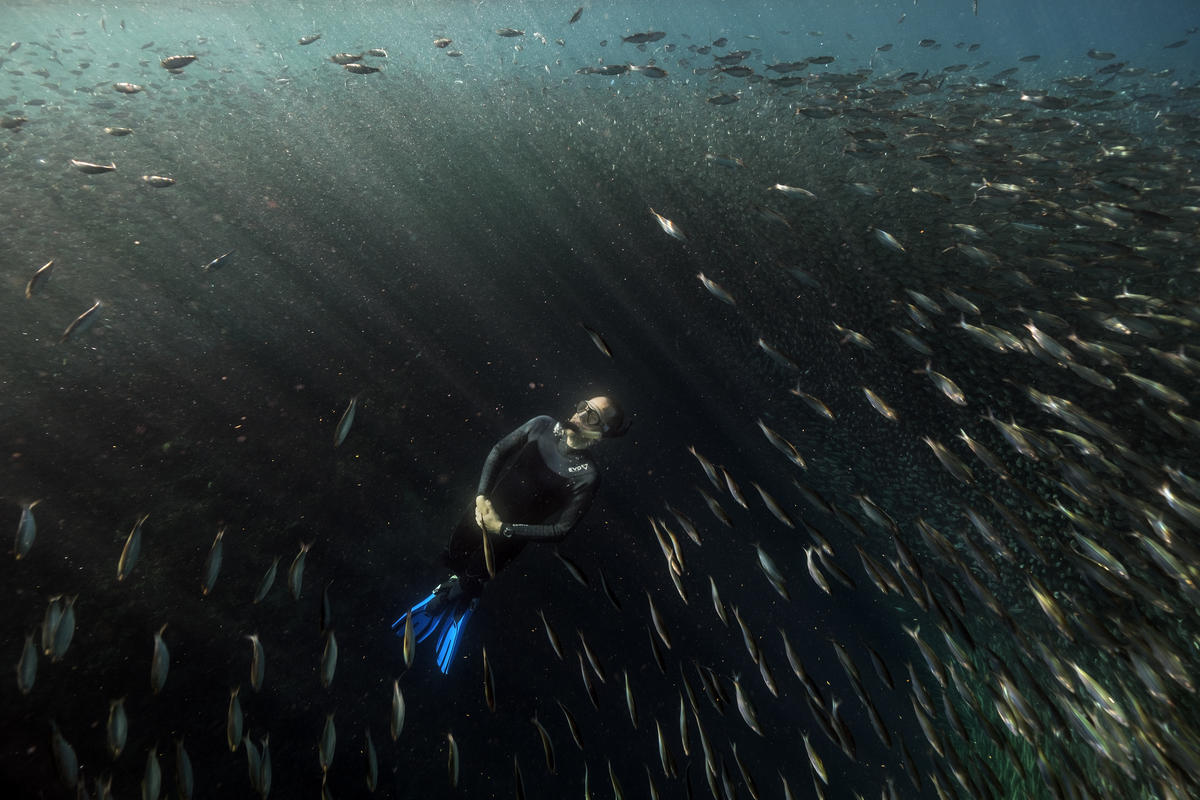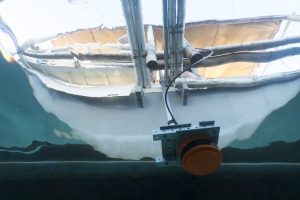Can ecotourism increase climate resilience in tropical small-scale fishing communities?
By Christopher Cusack, Edwina Garchitorena and Rod Fujita
Globally, fisheries are of great importance. Yet small-scale fishers and their communities in the tropics are among the most vulnerable to the impacts of climate change. Rebuilding and managing the fish stocks that these communities rely on is critical to ensuring the food security and climate resilience of hundreds of millions of small-scale fishers globally. Generally, we know how to achieve this: reduce fishing pressure to allow stocks to grow to healthy levels and protect and improve fragile ocean ecosystems.
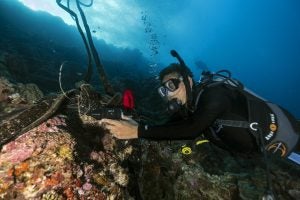 This is easier said than done, and we know that a lot of slow but essential progress must be made. But what about in the short-term? How do fishermen find alternative sources of income and livelihoods that enable them to reduce fishing pressure?
This is easier said than done, and we know that a lot of slow but essential progress must be made. But what about in the short-term? How do fishermen find alternative sources of income and livelihoods that enable them to reduce fishing pressure?
One possibility is the development of ecotourism in tropical communities. Ecotourism is based on the ability of natural ecosystems to attract tourists who spend money on guides, equipment, restaurants, hotels and other goods and services, which in turn generate income, jobs and revenues. There are many examples of this around the world, most centered around “charismatic megafauna” such as whales, dolphins and large fish such as sharks and rays. But situations where these species are present consistently and can form the basis for an ecotourism industry are relatively rare across the tropics. What is more common are communities with good (or improvable) overall environmental quality and the presence of smaller species such as reef fish and sea turtles. The coastal community of Moalboal is one interesting example.
In 2019, a team of scientists from EDF, Cornell and Stony Brook University traveled to Moalboal in the Philippines. The mission: to see whether we could use a portable acoustic transponder — or sonar — to quantify the biomass of sardines and herrings. The reason: to see if ecotourism reliant on these fish stocks could be more valuable than harvesting the fish themselves.
Many countries, including the Philippines, depend on fisheries to generate food and income by catching them. Sometimes the pressure to catch these fish is intense, driven by poverty. However in Moalboal, a ban on fishing had been imposed in a marine sanctuary to protect these small silvery fish, and we became curious about that.
The reason for the fishing ban soon became clear — we saw boatloads of tourists visit the marine sanctuary every day and noticed that a lot of dive shops were promoting trips to “swim with the sardines.” We soon joined them, and the experience was wonderful: we were surrounded by constantly shifting silvery curtains of fish suspended in the clear azure waters.
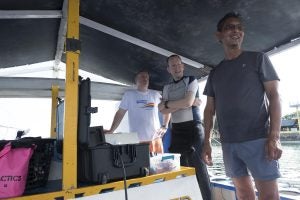 Being scientists, we couldn’t help but try to quantify the value of this ecotourism industry relative to the value of catching these fish. (You can read more about this research in our recent paper.) First, we mounted our portable transducer onto a Philippine dive boat and surveyed the marine sanctuary in the morning, during the day and in the evening. We used the data to estimate that there were about 50,000 herring in the sanctuary. At the going rate of $2/kg, the whole school was worth about $33,000.
Being scientists, we couldn’t help but try to quantify the value of this ecotourism industry relative to the value of catching these fish. (You can read more about this research in our recent paper.) First, we mounted our portable transducer onto a Philippine dive boat and surveyed the marine sanctuary in the morning, during the day and in the evening. We used the data to estimate that there were about 50,000 herring in the sanctuary. At the going rate of $2/kg, the whole school was worth about $33,000.
We then looked at the different kinds of economic benefits the herring school generated to estimate its value for ecotourism. This included jobs as guides and in the hospitality industry, user fees collected by the local government, hotel stays, scuba rentals and excursion fees. We estimated the total economic value of the herring school: about $17 million.
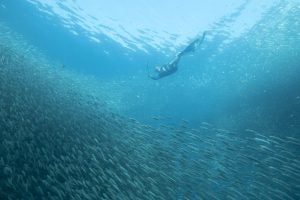 The Moalboal tourism industry isn’t founded on the presence of whale sharks or giant sting rays. Instead, it rests on a network of marine reserves and a school of tiny fish that hangs out in one of the reserves during the day. And what’s somewhat surprising is the fact that the marine reserves have been self-enforcing over the years; the community recognizes that the value of maintaining environmental quality far outweighs the value of harvesting the marine resources. How did this come about and what are the key lessons for other communities in the tropics?
The Moalboal tourism industry isn’t founded on the presence of whale sharks or giant sting rays. Instead, it rests on a network of marine reserves and a school of tiny fish that hangs out in one of the reserves during the day. And what’s somewhat surprising is the fact that the marine reserves have been self-enforcing over the years; the community recognizes that the value of maintaining environmental quality far outweighs the value of harvesting the marine resources. How did this come about and what are the key lessons for other communities in the tropics?
We found four broad enabling conditions that have allowed the Moalboal ecotourism industry to develop and thrive.
First, the quality of the coral reef ecosystems and the presence of the herring school provide the draw for tourists to come and visit. Without this natural capital, it is unlikely that Moalboal would generate the huge economic value it currently does.
Second, the management structure in Moalboal is centered around the community itself. The municipality governs nearshore marine resources and includes community stakeholders in management decisions. The municipality serves an important role assessing fees for visitation of marine reserves and using those fees to administer and enforce regulations, including hiring local marine reserve monitors and enforcement agents.
Third, effective community-based enforcement of the marine reserves is enabled by their relatively small size and proximity to shore. We could see the boundaries of the herring sanctuary from the beach in front of our hotel. If one can visually delineate the boundaries of a reserve, enforcement is much easier than if a boundary is an “imaginary” line in the ocean several miles to sea.
And fourth, a large proportion of the economic benefits generated in Moalboal accrue to local community members. Rules governing foreign ownership mean Filipinos own at least half of all businesses in the community. This probably goes a long way toward preventing the “economic leakage” that characterizes many ecotourism ventures, where most of the profits go to outside tourism operators and investors rather than to the local community.
And benefits of the ecotourism industry don’t stop there. The authors estimate that the ecotourism industry provides around 1,000 jobs to local community members, including some current and former fishermen.
Ecotourism can help reduce pressure on fish stocks in small-scale fisheries by providing good jobs, profits and revenues that can be used to provide the services that people need. And you don’t need whales and other charismatic megafauna to generate these benefits — little fish can do it, too.










